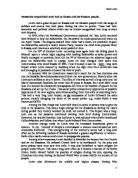Coursework Mr Groves
Assess The Impact Of Stalin On Russia And The Russian People?
Now that Stalin was in power, he was determined to modernise the USSR so that it could meet the challenges which were to come. He took over a country in which almost all the industry was concentrated in just a few cities and whose workers were unskilled and poorly educated. Many regions of the USSR were in the same state as they had been a hundred years earlier. So, Stalin wanted to make a few changes and believed that: “Throughout history Russia has been beaten again and again because she was backward” and that the USSR was “50 to 100 years behind the advanced countries. Either we make good the difference in ten years or they crush us” so in order to do this Stalin ended Lenin’s NEP because he believed is was such a slow process and needed a dramatic change for Russia to become a world power. So Stalin set about achieving modernisation through a series of Five-Year Plans which was for towns and industrial workers and also made a modernisation plan for peasants and countryside’s throughout Russia. This was called collectivisation.
The Five-Year Plans were originally drawn up by the GOSPLAN, the state planning organisation that Lenin set up in 1921. They set ambitious targets for production in the vital heavy industries (coal, iron, oil, electricity). The plans were very complicated but they were set out in such a good way that by 1929 every worker knew what he or she had to achieve: GOSPLAN set overall targets for an industry, each region was told its targets, the region set targets for each mine, factory etc , the manager of each mine, factory etc set targets for each foreman, the foreman set targets for each shift and even for individual workers est. The first Five-Year Plan focused on major industries and was very ambitious. Tough targets resulted in the USSR’s increased production and created a foundation on which to build the next Five-Year Plans. The USSR was rich in natural recourses, but many of them were in remote places such as Siberia. So whole cities were built from nothing and workers were taken out to new industrial centres. Also the first Five-Year plan achieved targets in around the 4th year including an effective impact with propaganda. Stalin had wanted the Soviet Union to be a beacon of socialism and his publicity machine used the successes of industrialisation to further that objective. Not only that but new dams and hydro-electric power fed industry energy requirements. However, there was a bad side to this plan. Many people began to suffer as towns were being expanded rapidly in numbers of people living with no basic facilities like transport/ houses or medical facilities, making it very poor living conditions to live in. Also there was a big rationing and many people were running short on food supplies.

This is a preview of the whole essay
Teacher Reviews
Here's what a teacher thought of this essay
This is a secure response, with a good level of subject knowledge and a balanced and evaluative account of Stalin's impact. There is a good level of detail but statistics and dates could have been used more frequently. A few grammatical errors. 4 stars.







